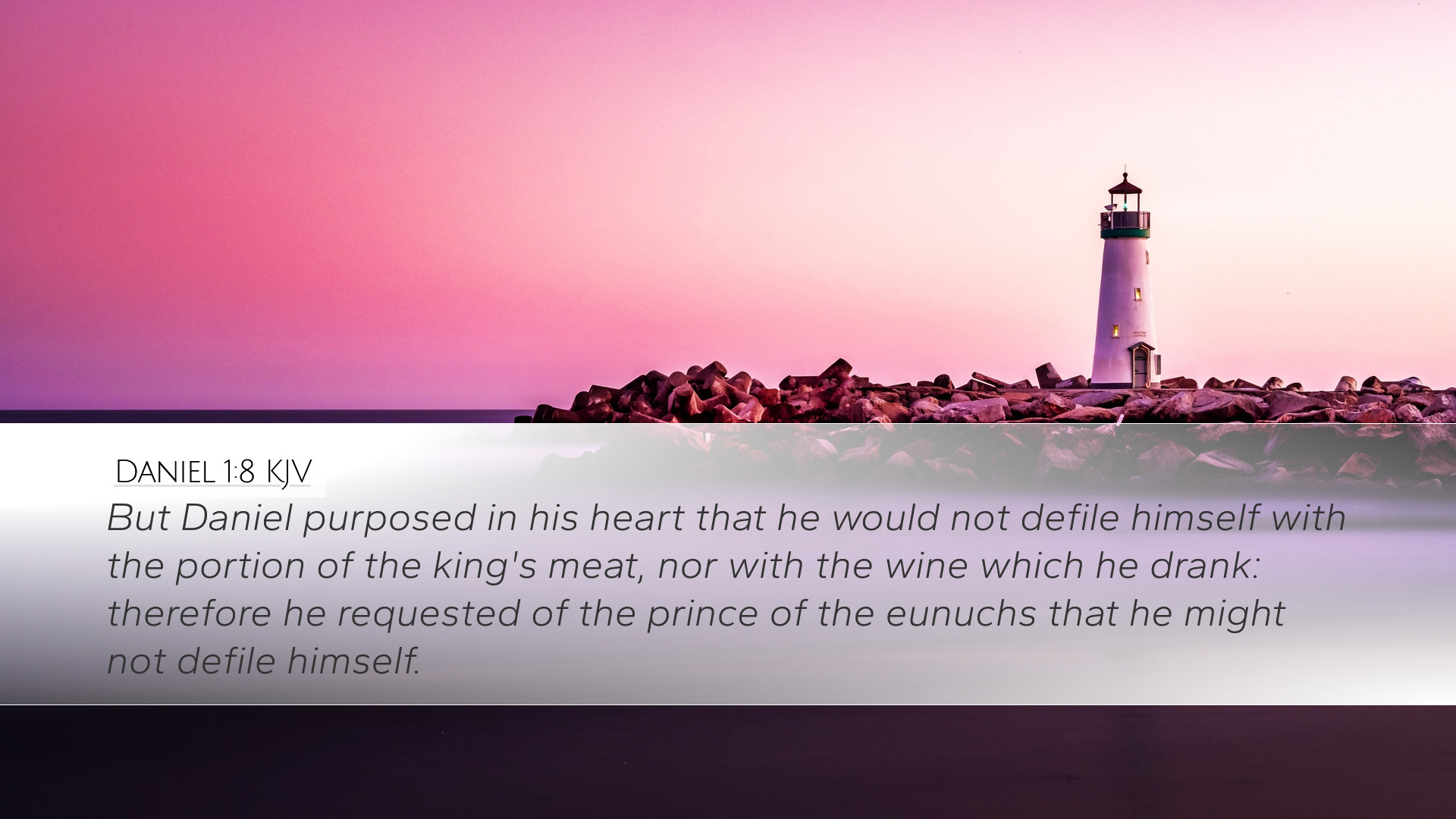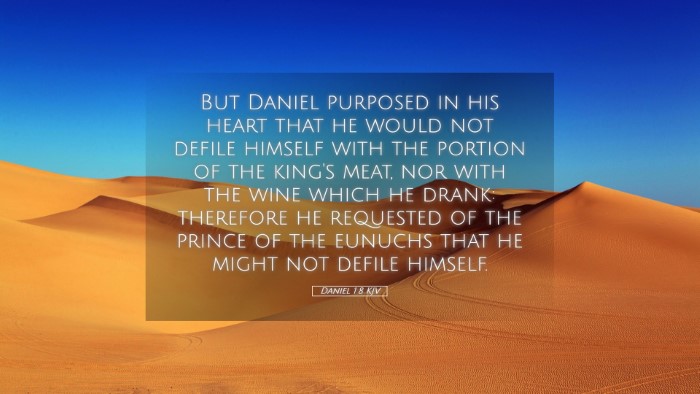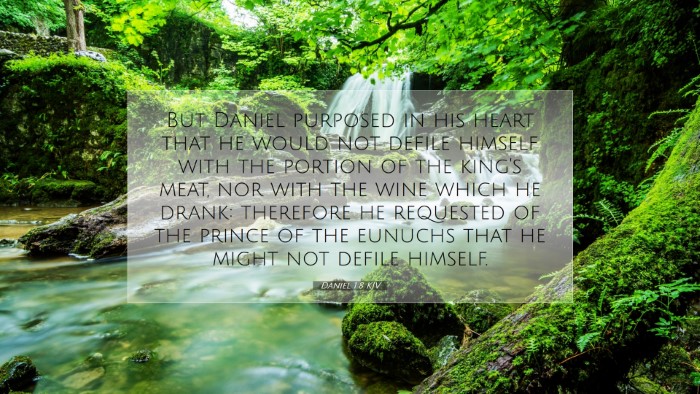Old Testament
Genesis Exodus Leviticus Numbers Deuteronomy Joshua Judges Ruth 1 Samuel 2 Samuel 1 Kings 2 Kings 1 Chronicles 2 Chronicles Ezra Nehemiah Esther Job Psalms Proverbs Ecclesiastes Song of Solomon Isaiah Jeremiah Lamentations Ezekiel Daniel Hosea Joel Amos Obadiah Jonah Micah Nahum Habakkuk Zephaniah Haggai Zechariah MalachiDaniel 1:8
Daniel 1:8 KJV
But Daniel purposed in his heart that he would not defile himself with the portion of the king's meat, nor with the wine which he drank: therefore he requested of the prince of the eunuchs that he might not defile himself.
Daniel 1:8 Bible Commentary
Commentary on Daniel 1:8
“But Daniel purposed in his heart that he would not defile himself with the portion of the king's meat, nor with the wine which he drank: therefore he requested of the prince of the eunuchs that he might not defile himself.”
Introduction
Daniel 1:8 presents a significant moment in the life of Daniel and his companions, revealing critical insights into themes of faith, integrity, and covenant loyalty. This verse sets the stage for their subsequent trials and triumphs in Babylonian captivity.
The Context of Daniel's Decision
This verse occurs in a historical context where Daniel and other young men from Judah were taken captive to serve in Babylon. The Babylonian king Nebuchadnezzar aimed to assimilate these captives into his culture, which included exposure to royal food and drink.
Daniel's Purpose
Daniel's decision not to defile himself can be seen as a reflection of his deep commitment to God's laws. According to Matthew Henry, "It is not enough to be good, one must also seek to be pure." Daniel made a conscious choice, evidencing his understanding of the implications of eating from the king's table, to maintain his spiritual and cultural identity.
- Purposed in His Heart: This phrase indicates a premeditated resolution. Daniel's commitment stemmed from his understanding of the dietary laws given to the Israelites. Adam Clarke underscores that this resolves in “a heart fully set to remain true to the faith of his fathers.”
- Not Defiling Himself: The concept of defilement is rooted in Levitical laws. The "portion of the king's meat" likely included food that was not prepared according to Jewish law or possibly offered to idols. Albert Barnes notes that Daniel's insistence on avoiding potential idolatry illustrates his deep-seated reverence for God.
Revelation of Inner Strength
Daniel’s resolve also demonstrates spiritual fortitude. Matthew Henry remarks, "The strength of a man is in his resolution, and his resolution is strong when it is well grounded in a true sense of things." This highlights that true strength comes from a well-informed and deliberate commitment to God’s principles, despite external pressures.
Request and Diplomacy
The latter part of the verse shows Daniel taking a practical approach by requesting permission from the prince of the eunuchs. His tactful request illustrates wisdom and diplomacy in a foreign land. The ability to ask rather than demand showcases Daniel’s understanding that his convictions needed to be communicated respectfully.
- Wise Diplomacy: Adam Clarke emphasizes that Daniel exhibited wisdom in making a respectful request, recognizing his vulnerable position.
- Seeking Favor: Daniel’s approach exhibits the idea of "finding favor" in the sight of others (Proverbs 3:4). Albert Barnes highlights that despite the precarious circumstances, God’s providence can work through careful and respectful negotiations.
Theological Implications
This text raises vital theological discussions regarding sanctification and the believer's relationship to the world. Daniel’s refusal of the king's meat has been interpreted as a broader metaphor for Christians' need to live in the world but not be of it. Matthew Henry elucidates that believers must draw lines in their moral conduct amidst a culture that challenges their faith.
Application for Today’s Believers
Daniel's stand serves as an exhortation for contemporary Christians to remain steadfast amidst a secular culture. It challenges them to:
- Reflect on Personal Convictions: Evaluate what "defiles" them in their daily lives, considering both material and spiritual aspects.
- Cultivate Spiritual Discernment: Seek knowledge and understanding of God’s Word to inform their decisions.
- Exercise Compassion and Diplomacy: Approach delicate situations with respect, remembering they must often navigate a culture that conflicts with their core values.
Conclusion
Daniel 1:8 is not merely a moral fable; it encapsulates the essence of faithfulness in the face of cultural opposition. Albert Barnes encapsulates the chapter’s essence as a lesson in courage and commitment to God’s commandments. In times of trial, believers are called to follow Daniel's example of integrity and purpose- anchored firmly in faith.


